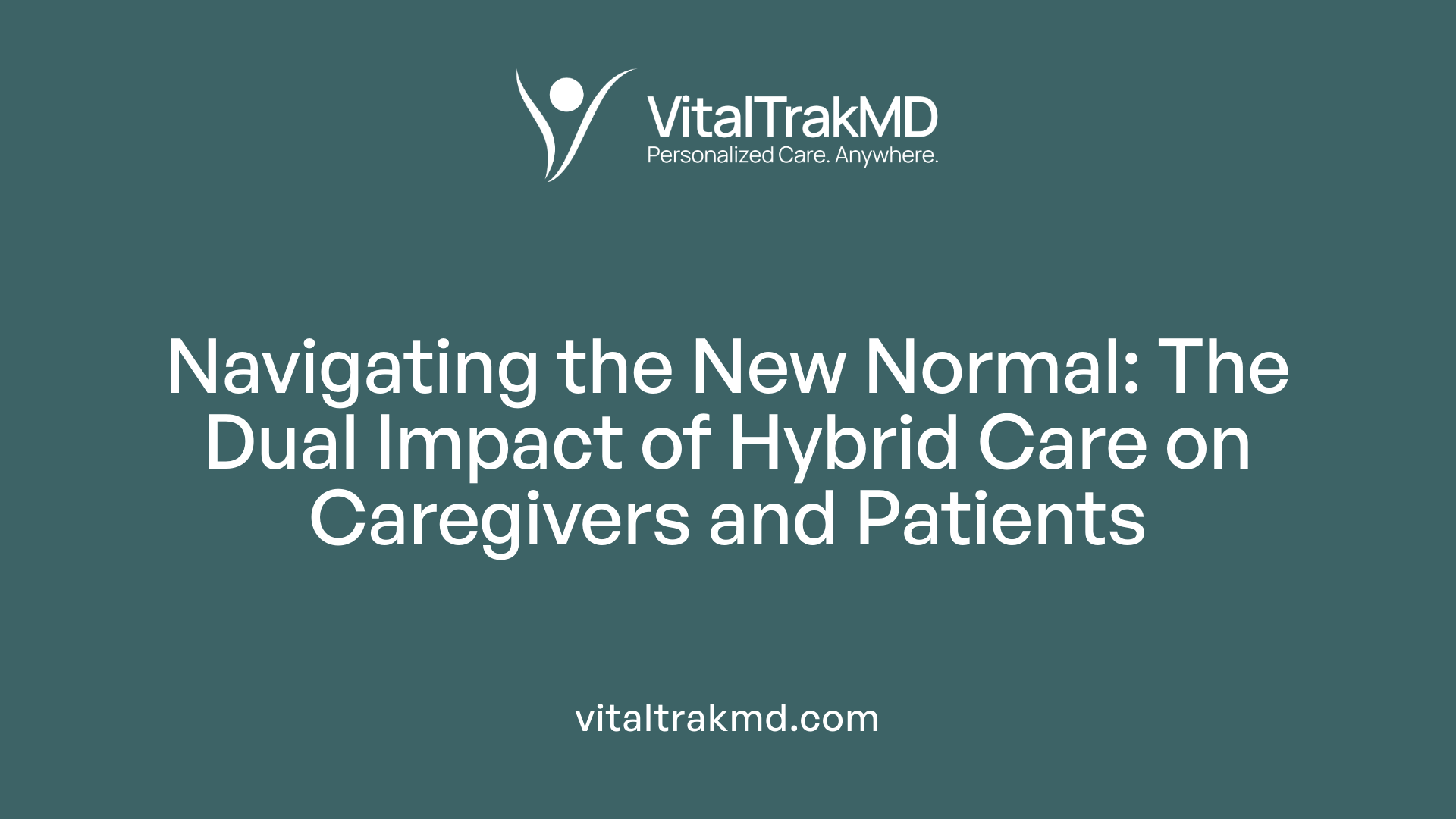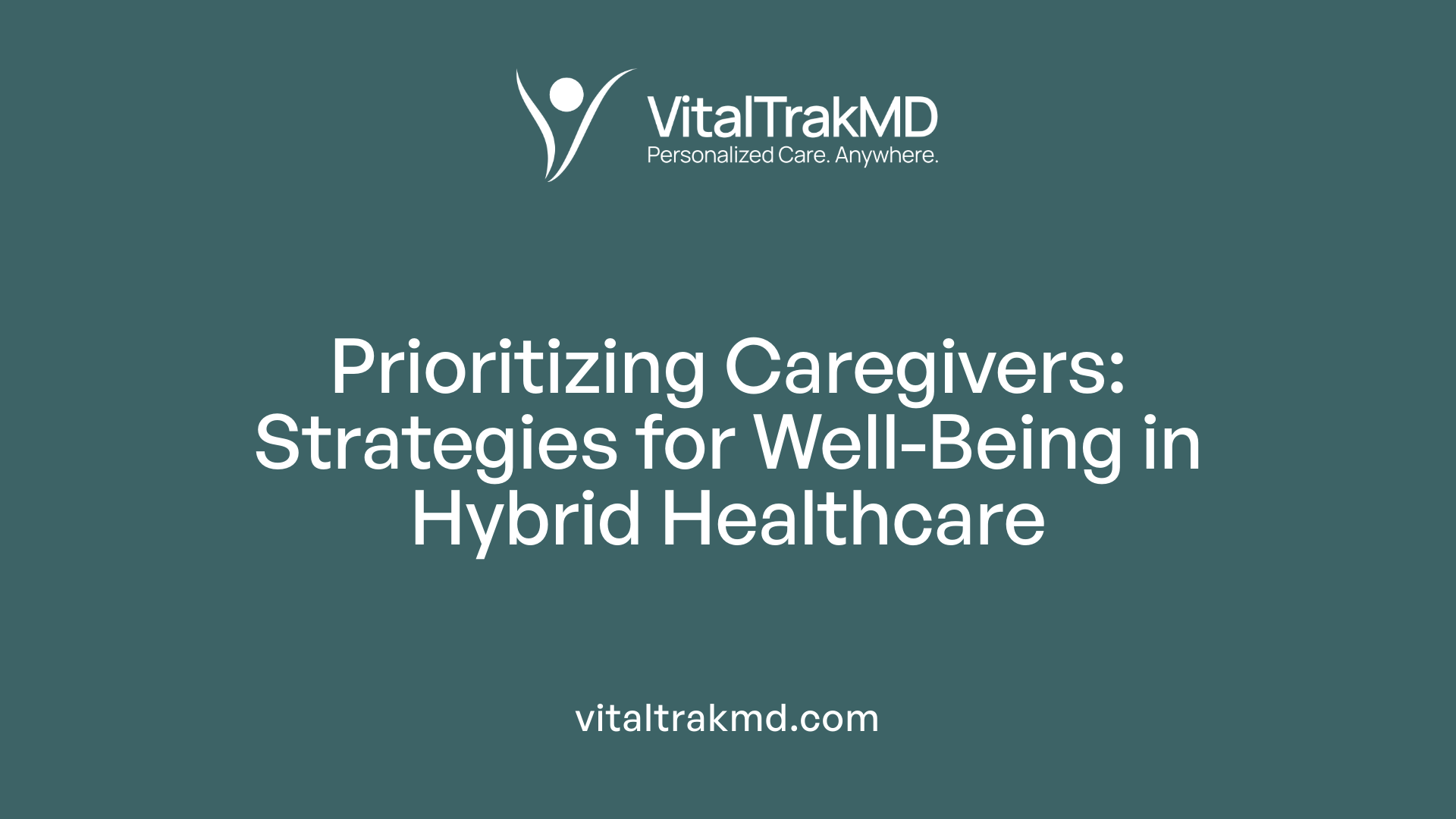A Caregiver’s Perspective on Managing Chronic Illness with Hybrid Care

Understanding the Evolving Landscape of Chronic Disease Management and Caregiver Engagement
As healthcare shifts towards hybrid models that blend telehealth with traditional care, caregivers find themselves at the forefront of this transformation. Their perspectives, challenges, and strategies are vital to optimizing patient outcomes and ensuring a sustainable, patient-centered approach to managing chronic illnesses. This article explores the complex role of caregivers within hybrid care frameworks, highlighting insights from research, technological innovations, policy considerations, and practical experiences.
The Multifaceted Challenges Facing Caregivers of Chronic Patients
How does chronic illness affect caregivers?
Caring for someone with a chronic illness involves continuous responsibilities that can take a toll on caregivers’ physical and emotional health. The persistent nature of these illnesses means caregivers often face ongoing stress, which can lead to feelings of burnout. Many experience heightened levels of anxiety, depression, and psychological distress as they manage complex medication routines, monitor health changes, and provide emotional support.
The psychological burden is compounded by the lack of clear communication and ongoing support from healthcare professionals. Caregivers frequently report feeling uncertain about best care practices and unprepared for emergencies, which elevates their stress levels.
Furthermore, caregiving is associated with significant financial hardships and social support deficiencies. Many caregivers spend substantial amounts of their resources to ensure proper care, sometimes at the expense of their own financial stability.
Social isolation is common as caregivers prioritize their loved ones over personal relationships and social activities. This lack of support can intensify feelings of loneliness and emotional distress.
Overall, the ongoing demands of caregiving, coupled with insufficient support, create a profound psychological burden that affects caregivers’ overall well-being.
What support do caregivers need?
Most caregivers express a need for more accessible and immediate healthcare services that are free of charge whenever possible. They emphasize the importance of home-based care options, which reduce the stress associated with frequent hospital visits.
Improved organization of healthcare delivery and better communication with healthcare teams are essential. Caregivers want clear guidance and ongoing support, including training and emotional assistance.
Social and familial support networks are also crucial. Many caregivers lack sufficient community support or family involvement, which can leave them overwhelmed.
Addressing these issues requires integrated strategies, including policy reforms, community resources, and healthcare models that recognize caregivers as vital partners in managing chronic illnesses.
| Aspect | Challenges | Suggested Improvements |
|---|---|---|
| Psychological | Stress, fear, burnout | Counseling services, caregiver support groups |
| Communication | Lack of clear info | Regular updates, caregiver training programs |
| Support & Services | Limited access, home care needs | Telehealth, home-based care options |
| Financial & Social | Expense, isolation | Financial aid programs, community engagement initiatives |
Caregivers play an essential role in supporting patients with chronic diseases. Recognizing their challenges and providing targeted support can improve outcomes for both caregivers and patients, fostering a more responsive and compassionate healthcare environment.
Understanding the Core Principles in Chronic Disease Management
The 4 C's — care coordination, first contact, continuity, and comprehensive care
In managing chronic diseases, the framework of the 4 C's plays a pivotal role in delivering efficient, patient-centered care. Care coordination ensures that all healthcare providers involved in a patient's treatment are aligned, sharing information seamlessly to avoid duplicated efforts and gaps in care. First contact refers to the patient's ability to access the healthcare system easily and promptly when symptoms arise, which is crucial for early intervention.
Continuity of care emphasizes ongoing, consistent management over time, fostering trust and better health outcomes. Comprehensive care involves addressing all aspects of the patient’s health, including physical, psychological, and social needs. Together, these elements form the bedrock of high-quality chronic disease management.
The 5 C's — control, compliance, complications, counseling, and customization
Expanding on the management principles, the 5 C's focus specifically on the behaviors and strategies that optimize disease control. Control involves maintaining clinical parameters within target ranges to prevent disease progression.
Compliance, or adherence, refers to patients following prescribed treatment plans, encompassing medication intake, lifestyle changes, and monitoring routines. Managing and preventing complications is also central, requiring vigilant monitoring and early intervention.
Counseling addresses patient concerns, fears, and questions, providing psychological support and education. Customization is about tailoring treatment and support strategies to each individual’s unique circumstances, preferences, and cultural context.
How these principles facilitate better care outcomes
Implementing the 4 C's and 5 C's enhances patient engagement, improves adherence to treatment, and reduces the risk of complications. When care is coordinated and continuous, patients experience fewer hospitalizations and better quality of life. Personalizing care through the 5 C's ensures that interventions are more acceptable and effective.
Furthermore, integrating technology, fostering multidisciplinary teams, and involving community support systems amplify these principles, ultimately leading to more sustainable and effective chronic disease management.
| Principles | Focus Areas | Strategies | Purpose |
|---|---|---|---|
| 4 C's | Care coordination, First contact, Continuity, Comprehensive care | Use of digital health tools, intersectoral collaborations | Improve accessibility, consistency, and quality |
| 5 C's | Control, Compliance, Complications, Counseling, Customization | Patient education, personalized medicine, self-monitoring | Enhance self-management, prevent adverse outcomes |
Understanding and applying these core principles are essential steps in transforming chronic care to meet evolving healthcare demands and improve patient experiences.
Strategies Empowering Caregivers in Managing Chronic Conditions
What strategies and approaches help caregivers manage chronic conditions effectively?
Caregivers play a vital role in supporting individuals with chronic illnesses such as diabetes, obesity, COPD, and heart failure. To manage these responsibilities effectively, caregivers need a multifaceted approach that addresses both practical and emotional aspects of care.
First, education is fundamental. Caregivers should seek reliable information about the patient’s specific condition, including its progression, daily management needs, and available support services. Understanding the illness helps set realistic expectations and allows caregivers to make informed decisions about care routines and interventions.
Building a strong support network is equally important. Engaging family, friends, and community resources can provide emotional relief and practical assistance. Connecting with healthcare professionals ensures caregivers receive ongoing guidance and reassurance, reducing feelings of isolation and uncertainty.
Proactive health management encompasses organized, routine-based care and self-care practices. Caregivers are encouraged to develop schedules for medication, monitor health indicators, and attend regular medical appointments. Incorporating health-promoting activities such as balanced nutrition, physical activity, sufficient sleep, and stress-relief techniques (like mindfulness or hobbies) supports both the caregiver’s well-being and the patient’s health.
Additionally, emotional resilience can be strengthened through positive thinking, acceptance of the caregiving role, and social engagement. These strategies help mitigate feelings of stress, fear, and burnout.
Pacing activities and managing one's own health are crucial to avoid exhaustion and maintain sustainable caregiving. Caregivers should also be proactive about seeking training and support services, which can include educational workshops, counseling, and respite care.
By combining education, organizational skills, emotional support, and self-care practices, caregivers can better navigate the challenges of chronic illness management, ultimately improving outcomes for both themselves and the care recipients.
| Strategy | Focus Area | Benefits |
|---|---|---|
| Education | Disease management, support services | Informed decisions, realistic expectations |
| Support networks | Emotional, practical assistance | Reduced isolation, shared responsibilities |
| Proactive health routines | Routine care, self-care practices | Improved physical and mental health, burnout prevention |
| Emotional resilience | Stress management, positive outlook | Better coping skills, mental well-being |
| Organizational skills | Planning, scheduling | Efficient care, reduced chaos |
Implementing these strategies creates a more resilient caregiving environment, enabling caregivers to effectively support their loved ones while maintaining their own health and well-being.
The Impact of Hybrid Care on Caregiver Responsibilities and Patient Outcomes

How does hybrid care impact caregiver responsibilities and patient outcomes?
Hybrid care models integrate traditional healthcare services with telehealth and other digital technologies, transforming the way caregivers support patients with chronic diseases. These models enable caregivers to use remote monitoring tools, electronic health records, and telehealth consultations to manage daily care tasks more efficiently.
Remote monitoring devices such as wearable sensors and digital health tools allow caregivers to keep track of vital signs, medication adherence, and other health indicators from a distance. This technology reduces the need for frequent in-person visits and provides real-time data that can alert healthcare professionals and caregivers to potential issues before they escalate.
Caregivers can also participate in virtual consultations, which improve communication with healthcare providers. This ongoing interaction ensures that care plans are tailored to the patient's evolving needs, promoting better disease management and early intervention.
Implementing hybrid care requires caregivers to develop digital literacy skills and access to appropriate resources. When caregivers are equipped with these tools and knowledge, they can provide safer, more coordinated care at home, addressing physical safety, emotional support, and social engagement.
Effects on patient safety are notable, including fewer hospital readmissions, improved medication management, and enhanced overall well-being. The flexibility of hybrid models allows caregivers to balance caregiving responsibilities with their own lives, reducing stress and burnout.
In summary, hybrid care models streamline caregiving tasks through advanced technologies and foster better communication, leading to improved patient outcomes and potentially alleviating caregiver burden. When properly supported, these models represent a significant step towards more compassionate, efficient, and patient-centered chronic disease management.
Technological Innovations Supporting Caregivers in Hybrid Settings
What technological tools support caregivers in hybrid healthcare settings?
In today’s evolving healthcare landscape, technology plays a vital role in empowering caregivers who provide support to patients with chronic diseases. Several innovative tools are designed to bridge gaps between traditional and telehealth services, making caregiving more manageable and efficient.
One of the most common technological supports includes telehealth platforms and video conferencing tools. These platforms enable remote assessments, consultations, and follow-up care, reducing the need for physical clinic visits. They facilitate continuous communication between caregivers, patients, and healthcare professionals, ensuring timely interventions.
Remote monitoring devices and wearable health technologies provide real-time health data. These tools monitor vital signs, physical activity, and other health indicators from afar, allowing caregivers and health providers to respond proactively to potential issues. Sensors and digital health devices help track medication adherence, detect emergencies, and ensure patient safety.
Mobile applications and online portals serve as accessible resources for caregivers. These digital platforms offer educational materials, medication management tools, and social support networks. They empower caregivers with information, improve their health literacy, and ease the emotional burden of caregiving.
Artificial intelligence (AI) and decision-support systems are increasingly integrated into caregiving platforms. AI-powered chatbots and virtual assistants provide personalized emotional support, answer health-related questions, and offer guidance tailored to specific conditions. Predictive analytics and machine learning models analyze health data to identify risks early, supporting timely interventions.
Wearable technologies, such as smartwatches and remote sensors, contribute significantly to caregiver support. They continuously gather health data like heart rates, oxygen levels, and activity patterns, alerting caregivers and clinicians to any anomalies. This continuous monitoring enhances the safety and health outcomes of vulnerable populations.
Overall, these technological tools help overcome geographical and temporal barriers that caregivers face. They enable more flexible, accessible, and effective hybrid healthcare services. By integrating these innovations into everyday caregiving routines, caregivers can reduce stress, improve patient outcomes, and strengthen their involvement in health management.
Addressing Challenges for Caregivers in Hybrid Environments

What are the challenges faced by caregivers in hybrid care environments, and how can they be addressed?
Caregivers operating within hybrid care models—blending telehealth and traditional healthcare—encounter a variety of obstacles that can impact their effectiveness and well-being.
One primary issue is technological barriers. Caregivers often lack sufficient training in digital tools necessary for remote monitoring, communication, and accessing health information. Without proper skills, they may feel overwhelmed or make errors that compromise patient safety.
Physical, emotional, and financial burdens also weigh heavily on caregivers. The increased responsibility, coupled with time-consuming tasks and financial strain, can lead to stress, burnout, depression, and even physical injuries such as musculoskeletal problems.
Addressing these challenges requires a multi-faceted approach:
- Targeted Education and Skills Training: Providing caregivers with easy-to-understand tutorials and ongoing support helps them navigate new technologies confidently.
- Respite and Support Services: Offering respite care options and emotional support groups can reduce burnout and foster resilience.
- Technological Infrastructure: Healthcare systems must ensure reliable internet access, user-friendly platforms, and secure data sharing to facilitate seamless interactions.
Implementing supportive policies is crucial. Regular assessments of caregiver needs can inform tailored interventions that recognize their role as 'secondary patients.' Care models should integrate caregiver well-being into overall patient care plans.
Strong collaboration among healthcare providers, community organizations, and caregivers enhances communication and resource sharing, resulting in better care quality and safety.
How can strategies be designed to mitigate stress and burnout among caregivers?
Effective strategies include establishing peer support networks, promoting self-care practices, and ensuring access to mental health services. Training programs that empower caregivers with problem-solving skills and coping mechanisms also contribute to resilience.
Additionally, technological solutions like remote monitoring and automated alerts can alleviate some physical tasks and reduce caregivers' workload.
Overall, recognizing caregiver needs and proactively addressing barriers through policy reforms, educational initiatives, and technological investments can significantly improve their experience and capacity to provide high-quality care in hybrid settings.
Supporting Caregiver Well-Being in Hybrid Care Models

What are effective interventions to support caregiver well-being within hybrid care models?
Addressing caregivers' mental health and overall well-being is crucial in hybrid caregiving environments that combine in-person and virtual support systems. Several intervention strategies have demonstrated success in this context.
First, comprehensive training and education programs are vital. These programs enhance caregivers’ knowledge about the patient's condition, improve caregiving skills, and foster confidence. Tailoring these programs to diverse populations through participatory and human-centered design ensures relevance and accessibility.
Peer support groups are another effective approach. They provide caregivers with emotional reassurance, shared experiences, and practical advice, reducing feelings of isolation and stress. Digital platforms facilitate these connections, making support more accessible regardless of geographical barriers.
Stress management resources are essential components of supportive interventions. Techniques such as mindfulness, relaxation exercises, and resilience training help caregivers cope with day-to-day challenges. Digital interventions, including web-based psychoeducation, telehealth consultations, and mobile apps, have proven effective in reducing depression, stress, and caregiver burden.
Studies indicate that these digital health solutions can also boost self-efficacy, resilience, and social support, contributing to better mental health outcomes and quality of life. Incorporating features like real-time communication with healthcare providers, peer interaction, and psychoeducational content enhances their effectiveness.
Implementing these interventions in hybrid care models involves overcoming organizational challenges such as staff turnover and organizational readiness. Successful adoption often hinges on stakeholder buy-in and adaptability of programs.
In summary, combining training, peer support, and digital stress management tools within hybrid models creates a scalable, efficient framework for maintaining caregiver well-being. This integrated approach supports caregivers in managing the emotional and practical demands of their role, ultimately improving care quality and health outcomes for patients.
Evaluating Caregiver Experiences and Outcomes in Hybrid Settings
How are caregiver experiences and outcomes studied in hybrid care settings?
Research into caregiver experiences within hybrid care models employs diverse methods to gather comprehensive insights. Quantitative tools, such as standardized surveys, are utilized to measure key aspects like caregiver satisfaction, perceived safety, and the quality of the interaction with healthcare providers. These surveys often include questions on reassurance, empathy, trustworthiness, and the usability of digital tools, along with practical measures such as the timeliness of care and diagnostic accuracy.
Complementing these are qualitative approaches such as ethnographic observations and semi-structured interviews. These methods delve into social dynamics, emotional responses, and perceptions of care within the home or community environments. They allow researchers to capture nuanced perspectives on issues like ease of access, rapport with healthcare professionals, and safety concerns.
The combined analysis of quantitative and qualitative data reveals recurring themes, including the ease of navigating hybrid services, the quality of communication, and the safety of patients and caregivers. These themes are central to understanding engagement levels and overall satisfaction.
By adopting this mixed-method approach, researchers can identify critical factors that influence caregiver outcomes, such as trust in the healthcare system, perceived caregiver burden, and the effectiveness of communication strategies. This comprehensive understanding helps inform improvements in hybrid care delivery, ensuring it is accessible, safe, and responsive to caregiver needs.
Themes influencing satisfaction, engagement, safety, and care quality
| Theme | Description | Impact on Caregiving |
|---|---|---|
| Ease of Access | How straightforward it is for caregivers and patients to utilize services, including digital tools. | Higher satisfaction and engagement when access is seamless and immediate. |
| Safety and Monitoring | The perceived or actual safety of the patient, including effective remote monitoring. | Enhances caregiver confidence and reduces anxiety. |
| Communication and Rapport | Quality of interactions and information exchange with healthcare professionals. | Builds trust, improves care coordination, and fosters engagement. |
| Usability of Technology | Convenience and user-friendliness of digital health tools employed in hybrid models. | Facilitates continuous involvement and reduces frustration. |
| Perceived Quality of Care | Caregivers’ and patients’ views on the effectiveness and thoroughness of treatment. | Direct correlation with satisfaction and adherence to care plans. |
| Safety Concerns | Issues linked to remote monitoring, data security, and clinical decision-making. | Addressing these concerns is critical for sustained engagement. |
This thematic analysis underscores the importance of a caregiver-centered focus in developing hybrid health models. Understanding and improving these elements will enhance caregiver experiences and ultimately lead to better health outcomes for patients with chronic illnesses.
The Future of Hybrid Care and Caregiver Support

What is the potential future landscape of hybrid care and caregiving support?
The evolution of healthcare towards hybrid models—combining traditional in-person services with telehealth solutions—offers exciting possibilities for improving chronic disease management and caregiver support. Advanced technologies such as artificial intelligence (AI), machine learning, and interoperable telehealth platforms are expected to play a central role. These innovations will enable more personalized, efficient, and accessible care experiences for patients.
As policies adapt, there will likely be expanded reimbursement for telehealth services, alongside stronger protections for patient privacy and data security. Standardizing care protocols across settings will facilitate broader adoption of hybrid models, making healthcare more seamless for both patients and caregivers.
Caregivers will benefit increasingly from digital tools that provide real-time health monitoring, virtual education, and community support. These resources can reduce psychological and physical burdens by offering immediate assistance and fostering a sense of connection.
Building resilient healthcare systems is essential for the successful implementation of these models. This involves ongoing research to validate innovative approaches, developing flexible policies, and investing in the training of healthcare professionals. Focus areas include enhancing care coordination, promoting patient-centered practices, and leveraging technology to bridge gaps in service.
In essence, the future landscape will be characterized by integrated, adaptable, and inclusive healthcare delivery systems where caregivers are recognized as vital partners. Empowering caregivers through supportive, innovative solutions will be crucial in managing the complexities of chronic illnesses and ensuring sustainable health outcomes.
Embracing Innovation for a Sustainable Caregiving Future
As healthcare continues to evolve with hybrid models, the role of caregivers takes on new dimensions—requiring support, education, and technological integration. Recognizing the physical, emotional, and practical challenges caregivers face is essential for developing effective interventions and policies. The integration of innovative technologies and patient-centered frameworks can alleviate burdens, improve patient outcomes, and create resilient healthcare systems. By embracing these advancements, healthcare providers, policymakers, and communities can build a sustainable future where caregivers are valued collaborators in managing chronic illnesses, ultimately fostering better health and well-being for all stakeholders.
References
- Investigating the Needs of Caregivers of Patients Suffering from ...
- The Perspectives of Patients with Chronic Diseases and Their ...
- Integrating Telehealth and Traditional Care in Chronic Pain ...
- Exploring experiences of family caregivers for older adults with ...
- Person-Centered Care Planning for People Living With or at Risk for ...
- Chronic disease self-management: A hybrid concept analysis
- Improving Chronic Illness Care: Translating Evidence Into Action
- The role of family caregiver for people with chronic illness
Recent articles
Want to Feel Better and Live Healthier?
Join hundreds of patients taking control of their health with personalized care that fits their life – not the other way around.
Rated 4.8/5 by 32+ customers







